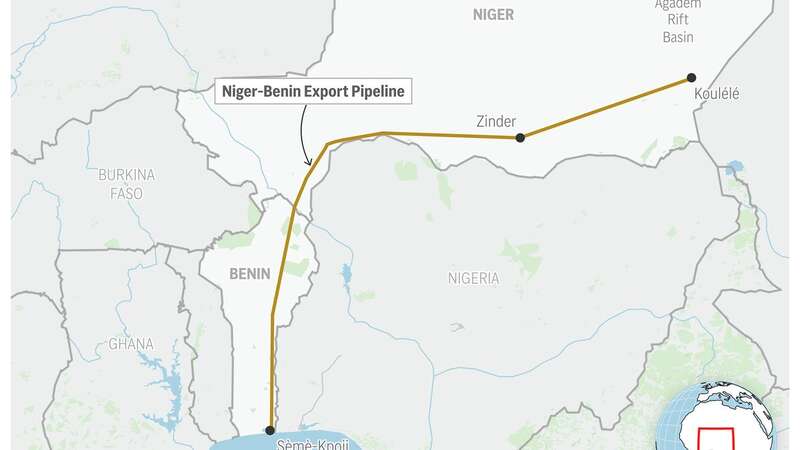
A China-backed pipeline, which could transform Niger into an oil-exporting nation, is under threat due to an internal security crisis and a diplomatic dispute with neighbouring Benin.
These issues have arisen following last year's coup that overthrew the democratic government of the West African country. The 1,930-kilometre pipeline, stretching from Niger's Chinese-built Agadem oil field to the port of Cotonou in Benin, was intended to boost Niger's oil production nearly fivefold through a $400million deal signed with China's state-run national petroleum company in April.
However, several obstacles have stalled progress, including a diplomatic spat with Benin that resulted in the pipeline's closure last week. Additionally, this week saw an attack by the local Patriotic Liberation Front rebel group, who claimed to have disabled part of the pipeline and threatened further attacks unless the $400million deal with China is scrapped.
Led by Salah Mahmoud, a former rebel leader, the group took up arms after Niger's junta seized power, adding to the country's existing security challenges. Analysts warn that these crises could further damage Niger, one of the world's poorest countries, which relies heavily on external support to fund its budget - support that has been largely withdrawn in the wake of the coup.
Niger, which only refines 20,000 barrels per day for domestic use, is set to start exporting up to 90,000 barrels daily through a new pipeline, in an economic move that experts believe will help the nation recover from international sanctions and boost its financial standing.
 Britain faces the worst recession among G7 partners, economists predict
Britain faces the worst recession among G7 partners, economists predict
"It is a completely messy situation and the only way for a resolution is if both administrations directly engage and resolve issues," mentioned Ryan Cummings, director of Signal Risk. A looming query relates to the potential impact on Niger's economy should the pipeline works come to a standstill. In projections by the World Bank, the West African country was anticipated to lead Africa's economic growth this year with a 6.9% rise, partly fuelled by oil exports.
Historical frictions with Benin surfaced once more after the coup detat in July that unseated President Mohamed Bazoum. This triggered border closures from neighboring countries and the rise of the so-called local liberation group threatening further assaults on the oil venture. Benin, along with other neighbouring countries, has reopened its border with Niger.
However, Nigerien officials have refused to reciprocate, accusing Benin of harbouring French troops that pose a threat to their nation following Niger's severance of military ties with France. This has prompted Benin's president, Patrice Talon, to make oil exportation through its port conditional on the reopening of the border.
The economic impact is being felt by both nations, with Benin also missing out on millions of dollars in transit fees. Observers suggest that this deadlock is exacerbating regional tensions since the coup, which followed a series of other military takeovers.
It has put Niger at odds with the Economic Community of West African States, or ECOWAS, which typically mediates in such situations. As Niger leans towards Russia in its diplomatic shift and Benin aligns with France and the West African bloc, China has attempted to intervene and resolve the stalemate, hoping to benefit from its investment in the project.
However, even Beijing's efforts, which led to the first lifting of oil from the Agadem field in May, fell apart as the diplomatic dispute escalated further. This week, Benin convicted and imprisoned three of five Nigerien oil workers it had recently arrested at the Beninese port after they crossed the border and were accused of "use of falsified computer data."
Their arrests led Niger to shut down the pipeline last week, with a senior government official alleging that their oil is being "stolen by other people." A major worry for Niger's military rulers is "whether they have the requisite fiscal capacity to keep paying for public services" in the wake of the coup, leading to difficulties in fulfilling financial commitments like debt repayment and funding for infrastructure, according to Cummings.
The current regime in Niger "definitely have to be more cautious in handling the financial position of the country" given the existing crises, he added.
Read more similar news:
Comments:
comments powered by Disqus

































